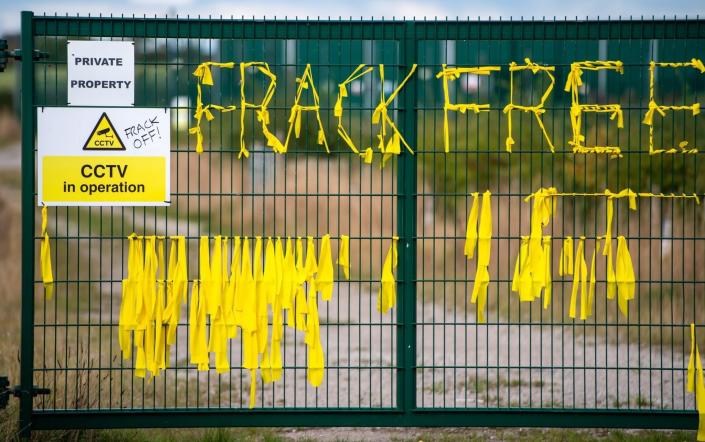
Opposition to fracking in the UK has been funded by the Putin regime, Jacob Rees-Mogg claimed on Thursday, as he faced backlash from his own party for lifting a three-year moratorium on shale gas extraction.
The Business Secretary accused those who oppose fracking of “hysteria” and “ludditery” and announced drilling will recommence in the “national interest,” even if it risked causing earthquakes.
Ministers argue that accessing reserves of subterranean shale gas will increase the UK’s energy security and could bring down the price of gas.
But the Government also faces backlash in Parliament, including from Conservative MPs who are unconvinced local people will be consulted about the drilling.
[embedded content]
On Thursday Mr Rees-Mogg told MPs he is “well aware” there are people who support the fracking ban, but noted that some opposition to drilling has been funded by Russia.
“I’m well aware that there have been objections to fracking, but I would also note that there have been stories widely reported that some of the opposition to … fracking has been funded by Mr Putin’s regime,” he said.
The claim was previously made by Anders Fogh Rasmussen, then secretary general of Nato, in 2014.
The defence chief said Russia was running “sophisticated information and disinformation operations” to support opposition to shale gas in the UK.
A Nato spokesman later said Mr Rasmussen was expressing a personal view.
Ed Miliband, the shadow climate change secretary, said Mr Rees-Mogg’s claim was an “absolutely outrageous slur”.
Labour and the Liberal Democrats both oppose lifting the moratorium on fracking and have respectively described it as a “dangerous fantasy” and of showing “callous disregard for our communities and countryside”.
The fracking ban was first put in place by the Conservatives after the 2019 election, following a 2.9 magnitude tremor at a site in Lancashire owned by Cuadrilla.
In April, following Russia’s invasion of Ukraine, ministers asked the British Geological Survey (BGS) to conduct an investigation into the link between shale gas extraction and earthquakes.
The resulting report, published on Thursday, concluded that predicting tremors remains a “scientific challenge for the geoscience community” and that more data would be required to make an accurate assessment of the likelihood of seismic events.
But in a written statement to MPs on Thursday, Mr Rees-Mogg suggested that the risk of further earthquakes was worth taking, and that more data could be collected when drilling resumes. “While HM Government will always try to limit disturbance to those living and working near to sites, tolerating a higher degree of risk and disturbance appears to us to be in the national interest given the circumstances described above,” he said.
“With this in mind, it is important that the policy relating to shale gas extraction reflects this.”
The announcement was opposed by several Tory MPs in the Commons chamber.
Sir Greg Knight said: “Is it not the case that forecasting the occurrence of seismic events as a result of fracking remains a challenge to the experts?
“Is it not, therefore, creating a risk of an unknown quantity to pursue shale gas exploration at the present time?
“Is he aware the safety of the public is not a currency in which some of us choose to speculate?”
Mark Menzies, a Lancashire Tory MP, said ministers must set out how they will obtain local consent from fracking if Ms Truss is a “woman of her word”.
Mr Rees-Mogg said that while he did not have a “formal thing” to announce about local consent, fracking companies will be asked to provide compensation packages for those who live near their sites.
“We should not be ashamed of paying people who are going to be the ones who don’t get the immediate benefit of the gas but have the disruption,” he said.
He added: “The hysteria about seismic activity, I think, fails to understand that the Richter scale is a logarithmic scale.
“This (fracking) is of such importance, and it is sheer ludditery that opposes it.”




